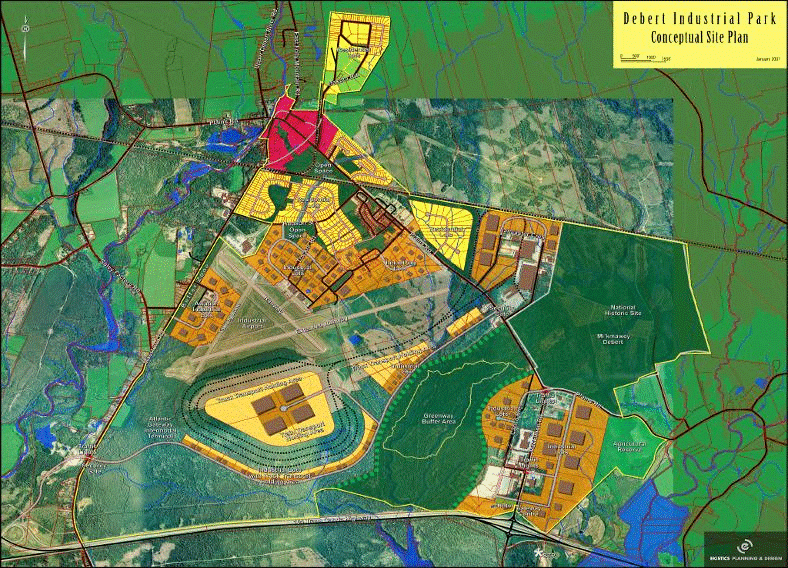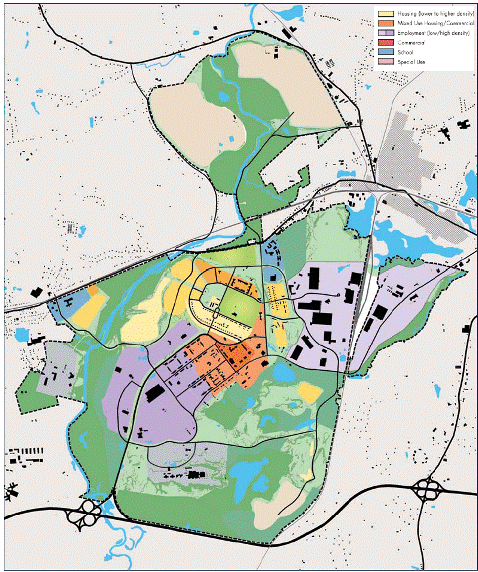Debert and Devens:
Colchester Regional Development Agency (CoRDA), Devens Enterprise Commission (DEC), are responsible for redeveloping former military bases. CoRDA’s mission is to “drive sustainable economic growth creating healthy communities, prosperous business and opportunity for our citizens.” CoRDA is responsible for attracting businesses to the Colchester, Nova Scotia region, and more specifically, for the purpose of this agreement, the former Canadian Forces Station, Debert and adjacent Air Industrial Park. The Devens Enterprise Commission (DEC) serves as the permitting and enforcement arm of the municipal government at the former Fort Devens military base and administer and enforce the Reuse Plan. The DEC is responsible for permitting all development activity in an expedited manner ensuring that development is approached in a sustainable manner. Both CoRDA and the DEC share a common interest in eco-industrial park development and related practices and have unique backgrounds and experiences in this area. Combining the diverse perspectives of the organizations’ representatives is the underlying principle of this Twinning Agreement that will result in a comprehensive approach to developing eco-industrial parks in Atlantic Canada and New England.
-
 DEC Chair Bill Marshall, CoRDA Director Jo Ann Fewer, Colchester County Planning Director Crawford MacPherson and DEC Director Peter Lowitt signing the Twinning Agreement at Red Tail Golf Course in Devens(Aug. 15, 2008).
DEC Chair Bill Marshall, CoRDA Director Jo Ann Fewer, Colchester County Planning Director Crawford MacPherson and DEC Director Peter Lowitt signing the Twinning Agreement at Red Tail Golf Course in Devens(Aug. 15, 2008). -
-
TWINNING AGREEMENT GOALS AND OBJECTIVES:
A. Goals
- Promote capacity building of the participating organizations and strengthen their expertise in the area of sustainable economic development projects.
- Promote eco-industrial park concepts and practices in Atlantic Canada and New England.
- Develop draft eco-industrial park certification criteria and program in conjunction with the Eco-Industrial Development Council of North America.
B. Objectives
- Minimize the environmental impacts associated with the ongoing development of the Debert Air Industrial Park and the Devens Industrial Park through innovative zoning regulations, alternative infrastructure, and bylaws that promote smart development practices.
- Provide programs and services to businesses located in the parks to help them gain economical and ecological efficiencies by making better use of resources.
- Extend the use of EcoStar into Debert. Compare services offered to businesses through the Eco-Efficiency Centre to identify compliments.
- Identify, clarify, and promote the competitive advantages businesses gain by locating in an eco-industrial park.
- Monitor how this marketing strategy draws interest in the location and influences the adoption of responsible practices by tenants.
- Further the establishment of eco-industrial parks at Debert and Devens.
PARTNERING AGENCIES:
Both the CoRDA and DEC entities work with partner agencies that are responsible for the infrastructure of their respective parks and are equally committed to successful redevelopment. Because land planning and business development issues are equally important in the establishment of an eco-industrial park, Colchester County and MassDevelopment Devens will be encouraged to play an active role in discussions and activities related to this joint initiative to further the sustainable redevelopment of their industrial parks.
 The Dalhousie University Eco-Efficiency Centre and Devens Eco-Efficiency Center will also contribute to this initiative. These organizations work with companies located in and around the Burnside and Devens industrial parks, respectively, to facilitate the adoption of more sustainable practices, including adoption and implementation of the EcoStar Program for eco-industrial development at Debert.
The Dalhousie University Eco-Efficiency Centre and Devens Eco-Efficiency Center will also contribute to this initiative. These organizations work with companies located in and around the Burnside and Devens industrial parks, respectively, to facilitate the adoption of more sustainable practices, including adoption and implementation of the EcoStar Program for eco-industrial development at Debert.
 Colchester County is the municipal entity that owns the infrastructure of Debert. The Municipality of Colchester is the municipal government for the area incorporating Debert Air Industrial Park. It is the organization that owns and manages the infrastructure and
Colchester County is the municipal entity that owns the infrastructure of Debert. The Municipality of Colchester is the municipal government for the area incorporating Debert Air Industrial Park. It is the organization that owns and manages the infrastructure and  responsible for Land Use Planning and permitting of development. In partnership with CoRDA, a development master plan was prepared for the Debert area to guide ongoing commercial and residential opportunities and will be the basis for land use planning in the near future.
responsible for Land Use Planning and permitting of development. In partnership with CoRDA, a development master plan was prepared for the Debert area to guide ongoing commercial and residential opportunities and will be the basis for land use planning in the near future.
Dalhousie University’s Eco-Efficiency Centre will work with CoRDA to provide a range of services to the Debert tenants to facilitate the adoption of sustainable business practices. The Centre “promotes responsible stewardship of resources, ecologically inspired design of products and processes, technologies that are ecologically and economically efficient and solutions that are innovative and environmentally adaptable.” More information can be found at http://eco-efficiency.management.dal.ca/.
 MassDevelopment Devens is responsible for the other aspects of municipal operations as well as the area’s economic redevelopment, per the State’s appointment. This agency owns the land at Devens and has control of the area’s infrastructure and utilities. Mass Development manages the day to day operations at Devens, acting as a municipality which is responsible for the infrastructure and real estate marketing components of the redevelopment efforts.
MassDevelopment Devens is responsible for the other aspects of municipal operations as well as the area’s economic redevelopment, per the State’s appointment. This agency owns the land at Devens and has control of the area’s infrastructure and utilities. Mass Development manages the day to day operations at Devens, acting as a municipality which is responsible for the infrastructure and real estate marketing components of the redevelopment efforts.
Debert Concept Plan

Devens Reuse Plan
Debert & Devens Eco-Industrial Twinning Agreement Makes Local Headlines!
